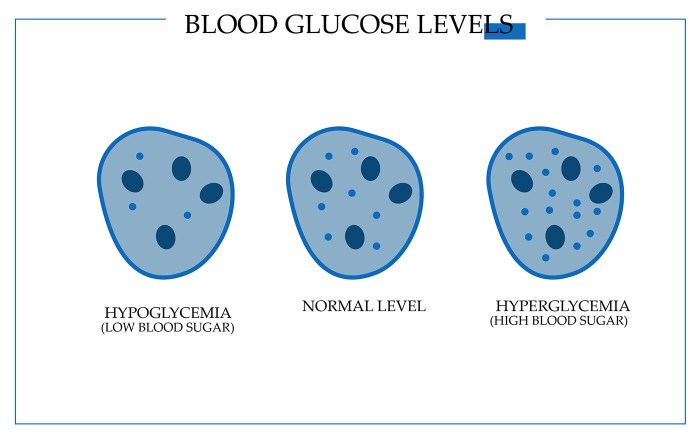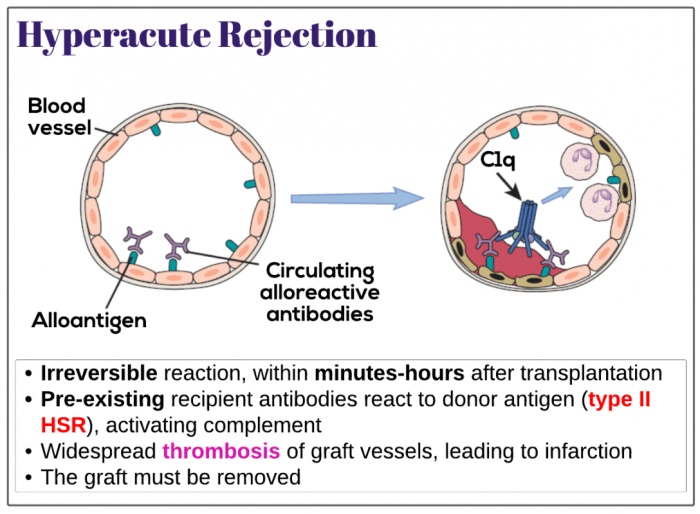Differentiate between abrupt onset hypoglycemia and gradual onset hypoglycemia – Hypoglycemia, a condition characterized by abnormally low blood sugar levels, can manifest in two distinct forms: abrupt onset and gradual onset. Understanding the differences between these two types is crucial for effective management and treatment. This article delves into the characteristics, causes, clinical presentation, and management strategies for both abrupt and gradual onset hypoglycemia, providing a comprehensive overview of this important topic.
Definition and Characteristics
Abrupt onset hypoglycemiais a sudden and severe drop in blood glucose levels that occurs within minutes or hours. It is characterized by a rapid onset of symptoms, often within 15-30 minutes of insulin administration or a missed meal. In contrast, gradual onset hypoglycemiais a gradual and less severe decline in blood glucose levels that develops over several hours or days.
| Characteristic | Abrupt Onset Hypoglycemia | Gradual Onset Hypoglycemia |
|---|---|---|
| Onset time | Within minutes or hours | Over several hours or days |
| Symptoms | Sweating, tremors, confusion | Fatigue, weakness, impaired concentration |
| Causes | Insulin overdose, missed meals | Liver disease, endocrine disorders |
Causes and Risk Factors

Abrupt Onset Hypoglycemia, Differentiate between abrupt onset hypoglycemia and gradual onset hypoglycemia
- Insulin overdose
- Missed meals
- Excessive exercise
- Alcohol consumption
Gradual Onset Hypoglycemia
- Liver disease (e.g., cirrhosis)
- Endocrine disorders (e.g., Addison’s disease, hypopituitarism)
- Certain medications (e.g., sulfonylureas, meglitinides)
- Autoimmune disorders (e.g., type 1 diabetes)
Clinical Presentation
Abrupt Onset Hypoglycemia, Differentiate between abrupt onset hypoglycemia and gradual onset hypoglycemia
Symptoms of abrupt onset hypoglycemia typically appear within 15-30 minutes of insulin administration or a missed meal. These symptoms may include:
- Sweating
- Tremors
- Confusion
- Anxiety
- Palpitations
Gradual Onset Hypoglycemia
Symptoms of gradual onset hypoglycemia are more subtle and may include:
- Fatigue
- Weakness
- Impaired concentration
- Headache
- Blurred vision
Management and Treatment
Abrupt Onset Hypoglycemia, Differentiate between abrupt onset hypoglycemia and gradual onset hypoglycemia
The immediate management of abrupt onset hypoglycemia involves consuming fast-acting carbohydrates, such as glucose tablets, juice, or regular soda. If the patient is unable to swallow, glucagon can be administered.
Gradual Onset Hypoglycemia
Long-term management of gradual onset hypoglycemia involves addressing the underlying cause, such as modifying the insulin regimen, adjusting medications, or treating liver disease. Dietary modifications, such as eating frequent small meals and avoiding sugary foods, may also be recommended.
Differential Diagnosis

| Condition | Symptoms | Causes |
|---|---|---|
| Seizures | Loss of consciousness, convulsions | Epilepsy, brain injury |
| Stroke | Sudden weakness or numbness on one side of the body, difficulty speaking or understanding speech | Blood clot or bleeding in the brain |
| Transient ischemic attack (TIA) | Temporary symptoms of a stroke that resolve within 24 hours | Temporary interruption of blood flow to the brain |
Accurate differential diagnosis is crucial to ensure appropriate treatment. Abrupt onset hypoglycemia should be considered in patients with a history of diabetes or insulin use who experience sudden symptoms. Gradual onset hypoglycemia may be suspected in patients with chronic liver disease, endocrine disorders, or certain medications.
Prevention and Education: Differentiate Between Abrupt Onset Hypoglycemia And Gradual Onset Hypoglycemia

Abrupt Onset Hypoglycemia, Differentiate between abrupt onset hypoglycemia and gradual onset hypoglycemia
Preventing abrupt onset hypoglycemia involves:
- Regular insulin monitoring
- Proper meal planning
- Carrying fast-acting carbohydrates
- Educating family and friends about the symptoms and treatment of hypoglycemia
Gradual Onset Hypoglycemia
Managing gradual onset hypoglycemia involves:
- Recognizing symptoms
- Seeking medical attention if symptoms persist
- Understanding the underlying cause and treatment options
- Making lifestyle modifications as recommended by a healthcare professional
FAQ Corner
What are the key differences between abrupt onset and gradual onset hypoglycemia?
Abrupt onset hypoglycemia occurs suddenly, often within minutes, and is characterized by severe symptoms such as sweating, tremors, and confusion. Gradual onset hypoglycemia, on the other hand, develops over hours or days and presents with more subtle symptoms such as fatigue, weakness, and impaired concentration.
What are the most common causes of abrupt onset hypoglycemia?
Abrupt onset hypoglycemia is typically caused by factors that rapidly lower blood sugar levels, such as an insulin overdose or skipping meals.
What are the long-term management strategies for gradual onset hypoglycemia?
Managing gradual onset hypoglycemia involves addressing the underlying cause, which may include dietary modifications, medication adjustments, or lifestyle changes.